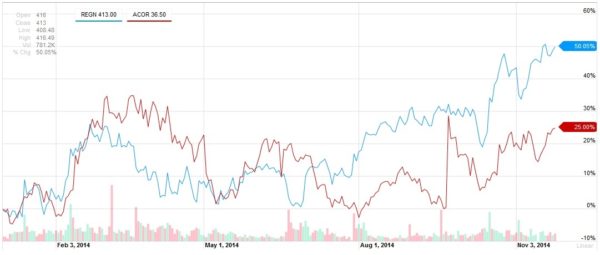Investing in Westchester’s biotech surge

Once a stalwart of corporate headquarters, Westchester County has been reinventing itself as a center for biotechnology research.
Firms like Acorda Therapuetics Inc., Regeneron Pharmaceuticals Inc., ContraFect Corp. and Progenics Pharmaceuticals Inc., all headquartered in the county, are developing new and innovative treatments for diseases. Some, like Regeneron”™s Eylea, a drug that treats swelling inside the eye, have gained approval from the U.S. Food and Drug Administration and are reaping profits. Others, like the treatments ContraFect is developing for diseases like influenza and MRSA, are still being developed.
“We”™re not so stuck in what we do next ”” we”™ve found what we do next in Westchester,” Westchester County Association President Marissa Brett told WAG magazine, the Business Journal”™s sister publication, recently. “We”™re seeing more and more, whether it”™s tech companies developing software for (biotechnology), or research and development. We”™ve planted the flag saying, ”˜We are going to capitalize on this and really create an identity for ourselves.”™”
With the approval and marketing of drugs, the companies ”” and their investors ”” hope to make a profit. But how does an investor get in on Westchester County”™s biotech boom?
The obvious way is to simply buy stock in Westchester County-based biotech firms. Regeneron, Acorda, ContraFect and Progenics all are publicly traded companies. But with straight stock investment comes risk, and investors have to parse a lot of data to evaluate that risk.
For example, Acorda and Regeneron are billion-dollar corporations ”” Acorda has a market capitalization (the total value of all its outstanding stock) of about $1.4 billion, while Regeneron”™s market capitalization is more than $41 billion. Regeneron Pharmaceuticals trades at about $400 per share, while Acorda Therapeutics trades for about $36 per share. Both stocks trade on the Nasdaq.
“The literature shows that $30 is the sweet spot, meaning that there”™s an optimal mix of retail and institutional investors,” said Padma Kadiyala, a professor of finance at Pace University”™s Lubin School of Business. “As share price goes up, the number of investors that can afford to buy shares of the stock goes down. It”™s harder for mom and pop to invest in stocks with share prices over $100.”
Kadiyala explained that shares of stock trading between $30 and $100, such as Acorda, are more liquid than stocks trading at higher prices, such as Regeneron. Because those shares are more liquid, they also get more attention and coverage from securities analysts, who examine corporate financial data to determine investment risk. And because there is more analysis of the stocks for investors to peruse, it”™s easier, at least in theory, for them to make a determination.
Analysts, when reporting their research on a corporation, generally assign a rating to the stock, which may be expressed as “buy,” “hold,” “sell,” or a number of stars or rating on a scale.
For example, S&P Capital IQ”™s Nov. 22 report on Regeneron rated the stock a “buy” and gave it four stars out of five.
“Our risk assessment reflects our view that (Regeneron) is nearing approval of additional indications for Eylea, which we expect to provide revenue diversification,” S&P Capital IQ analyst Jeffrey Loo said in the report, which assessed Regeneron”™s risk as “medium.” “In addition, we see the company advancing a robust clinical pipeline in collaboration with Sanofi, which has contributed significant R&D funding, easing the pipeline”™s risk profile, in our view. Still, we see development risk given the competitive environment for key pipeline candidates in large target markets.”
Meanwhile, on Nov. 21, Ford Equity Research rated Regeneron as a “sell,” based on the stock”™s earnings strength and relative valuation.
While Regeneron has posted positive earnings per share, those earnings “have declined to an estimated $3.62 from $3.80 (per share) over the past five quarters, they have shown deceleration in quarterly growth rates when adjusted for the volatility of earnings. This is an indication of weakness that could lead to declining earnings,” the report said. Ford Equity Research said it feels that despite positive stock price movement (in 2014, Regeneron”™s stock is up nearly 50 percent), the stock is overvalued.
“The investor needs to be aware of the risk,” said Kadiyala. “When it comes to biotech, no matter how much info that”™s out there, it”™s difficult to evaluate the risk.”
Companies in the biotechnology sector have unique risks, such as the possibility that the drug the company spent hundreds of millions researching over several years does not get FDA approval.
“It can be difficult to figure out what”™s idiosyncratic risk and what”™s market risk,” Kadiyala said.
Kadiyala said less-sophisticated investors can mitigate that idiosyncratic risk by investing in index funds or exchange-traded funds that invest in the biotech sector. Those funds generally have experienced analysts picking the stocks that the fund invests in to spread out the risk.
“It seems to be better rather than to invest in companies that are highly specific to invest in a fund, because of the information parsing,” Kadiyala said.
Currently, 71.2 percent of Regeneron”™s stock and 90.3 percent of Acorda”™s stock is held by institutions or mutual funds.